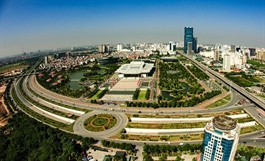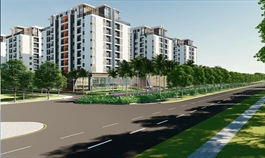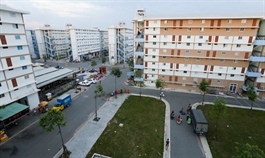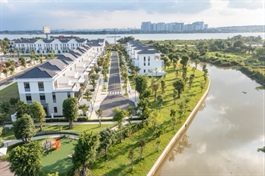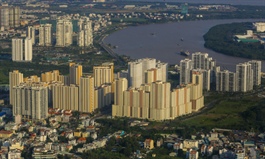Potential smart device market for Vietnam’s smart real estate development
Potential smart device market for Vietnam’s smart real estate development
Building smart homes is the way to go for local property developers to lure buyers.
The total value of the smart home device market is estimated at US$123 million per year in Vietnam while the penetration rate is expected to be less than 10% in 2021. This potential is being untapped by home developers in order to boost smart real estate in Vietnam.

Delegates discuss smart real estate at the webinar. HNT Photo |
Hoang Nam Tien, Chairman of FPT Software gave his forecast at the webinar “Smart real estate - Trends and Solutions” which is held within the framework of Smart City Summit 2021” on November 3.
According to FPT Software’s study, as of January 2021, about two million people out of a total of 22 million Vietnamese families have spent on smart home devices. The average revenue per user (ARPU) on integrated smart devices is $60 while the amount paid for the control and connectivity segment of the smart home and for smart appliances are $22 and $79, respectively.
Tien believed that those who own a VND2-billion ($87,900) house are willing to spend 2% of the asset value for smart home solutions to protect their family’s health and safety. However, the so-called “smart cities/homes” projects developed by real estate companies have not really met the needs of the owners.
According to Tien, real estate developers are often under great pressure when are required to make a difference to attract local buyers. This is a never-ending race for innovations.
“In the past, the developers focused on advertising project strengths such as location and design and now it’s time to invest in smart urban areas and houses,” he added.
Smart devices applied in the management system of urban areas or buildings are able to connect hospitals and dwellers for a health check. This is especially helpful in the current context of the Covid-19 pandemic. Real estate investors providing smart solutions have not earned customers’ trust, and investors are not shaking hands with tech providers to deploy smart housing projects, Tien said.
“Smartly-designed house or apartment will save 30% on the electricity bill. If smart solutions cost about 5% of the total value of the property, I believe homebuyers are pleased to pay,” he underlined.
Being of the same mind, Phan Thanh Son, Business Development Director of FPT Information System said in the world, investment in the smart management system is around 5-10% of the real estate value and can save between 5 and 10% in operating costs of a real estate project for 50 years. “This also adds value to users such as medical and security experiences,” he added.
Delegates had the same view that tech companies need to build solutions and connect devices to each other, and it is a challenge. “How can there be a standard model so that technology companies can put those solutions into this model,” Le Thanh Tung, CEO of BKAV Smart.
|
To become a smart city by 2030, Hanoi planned to build the core components for the first phase, including the infrastructure platform, core database, e-government, and smart systems in essential areas such as education, healthcare, transport, tourism, security, and environment. For the second phase in 2020-2025, smart systems will be basically complete, attracting people to join, and the digital economy should be formed.
In the last phase after 2025, the smart city will be developed at a high level characterized by a knowledge-based economy. Smart cities are being built in the city, of which the largest project is the $4.1-billion Smart City project in the city’s north Dong Anh District, developed by BRG Group in a joint venture with the Japanese Sumitomo Group.
The second-largest one is Xuan Mai Smart City with a $3.5 billion capital, located in Chuong My District and invested by Tan Hoang Minh Group. Another one was Vingroup’s Vinhomes Smart City in the capital’s south Tu Liem District.
|





